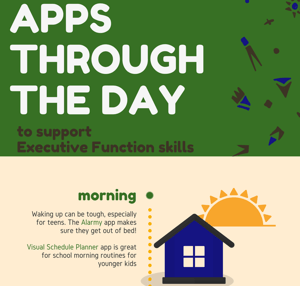Editor's note: This week, we feature guest blogger Annie Tulkin, Founder of Accessible College, where she provides college transition support nationally for students with physical disabilities and health conditions. Please read more about Annie below.
Students with health conditions, including diabetes, epilepsy, mental health conditions,  and other chronic health conditions face another layer of planning when transitioning to college. Colleges are required to provide “reasonable accommodations” for students with disabilities under the Americans with Disabilities Act (ADA), which are identified by determining the students’ functional limitations. However, these accommodations don’t account for the essential executive functioning skills that students need to develop prior to college in order to self-advocate and successfully manage continuity of care while pursuing higher education.
and other chronic health conditions face another layer of planning when transitioning to college. Colleges are required to provide “reasonable accommodations” for students with disabilities under the Americans with Disabilities Act (ADA), which are identified by determining the students’ functional limitations. However, these accommodations don’t account for the essential executive functioning skills that students need to develop prior to college in order to self-advocate and successfully manage continuity of care while pursuing higher education.
For example, a student with Attention Deficit Hyperactivity Disorder (ADHD) who has difficulty concentrating (functional limitation) might request a private testing room, which means following the university process to provide documentation and request an accommodation. It also requires the student to plan ahead and request private testing approximately 7 days before each test they take in order to receive the accommodation. A student with diabetes experiencing blood sugar fluctuations that impact their ability to function (functional limitation) may request breaks or opportunities to eat during class, necessitating the skill of planning ahead to pack food and communicate directly to a professor. These examples give us real-life snapshots of students faced with applying executive functioning skills of planning and self-advocating to receive supports that are needed for them to be successful in college.
Requesting accommodations for academics or housing in a college setting requires students to first contact the college’s Disability Support Office (DSO) and follow their university's process. Once that’s happened, what kinds of executive functioning skills in particular support effective transition to and through college? It’s important to remember that students with health conditions will likely have to manage a number of factors that their peers may not be managing. This includes things like medication management, healthcare appointments, and conversations with their health care providers. All of these are on top of the typical day to day of academics, social life, and adjustment to living away from home.
An area often neglected in the transition process is allowing students to take over some responsibilities related to their own care. Families who have students with health conditions need to be intentional in supporting students’ executive functioning skills to ensure that their student will be able to manage and maintain their health while they are at college; fostering executive function and self-advocacy skills early on can lead to a smoother transition. Below I’ve outlined three areas to focus on that incorporate executive functioning:
Medication Management
Many parents manage and monitor the student’s medication and take care of filling prescriptions for the student. As students move toward living independently, they will need to be able to manage their own medication. It’s important for students to have a system in place to monitor their medication. Those systems should be adopted before they go to college. In order to foster these skills, families can:
- Assist the student in setting up a medication management app or calendar to support the student in identifying when to take medication and how much and when they need to call for a refill. (note: many apps also have a section where users can track how the medication makes them feel. This can be beneficial data).
- Get the student a pill box and identify a specific day that the box gets filled (e.g.: every Sunday).
Executive Function skills addressed:
- Planning
- Self-Monitoring
Healthcare Appointments
Families start making doctor appointments for their child a few days into their infant's life! It can be a hard habit to break, 18 or so years later. Nevertheless, parents will eventually have to let their student take the reins and make their own appointments. In order to transfer this responsibility to the student, families can:
- Support students in scheduling their own appointments. Students should have a sense of their calendar and commitments, and be able to call to schedule an appointment independently.
- Co-construct a script and practice what the call might entail.
- Make sure the student has relevant health insurance information in a handy location.
- If your student has a recurring appointment, be sure they have a system in place for tracking and scheduling their appointment. Apps and electronic calendars can be very helpful.
Executive Function skills addressed:
- Planning
- Organizing
- Self-Monitoring
Conversations with Healthcare Providers
It can be challenging for parents to hold back from directing the conversation during medical appointments. However, the student should learn to ask questions and speak for themselves. This will help the student develop independence and self-advocacy skills. In order to practice letting the student converse with the healthcare provider, families can:
- Ask the healthcare provider to direct questions to the student to enhance the student’s ability to monitor health and self-advocate.
- Let the student handle the entire appointment by themselves.
- Support your student in creating a list of questions/concerns prior to each appointment.
- Rehearse the appointment with your student.
Executive Function skills addressed:
- Planning
- Organizing
- Self-Monitoring
Developing these executive functioning skills early on can help students with health conditions more easily adjust to college life. Once they have a system in place and they have practiced navigating these elements independently, with family support nearby, they will be a lot more confident using these skills once they are away at school.
Photo above by alexander bracken on Unsplash
 Annie Tulkin is the Founder and Director of Accessible College, where she provides college transition support for students with physical disabilities and health conditions nationally. Annie was the Associate Director of the Academic Resource Center at Georgetown University for nearly 6 years. In that position, she supported undergraduate, graduate and medical students with physical disabilities and health conditions and oversaw academic support services for the entire student body. She holds a Bachelor's Degree in Secondary Education from DePaul University, a Masters in Special Education from The University of Wisconsin-Madison, and a Certificate in Health Coaching from Georgetown University. She resides in Silver Spring, MD with her family.
Annie Tulkin is the Founder and Director of Accessible College, where she provides college transition support for students with physical disabilities and health conditions nationally. Annie was the Associate Director of the Academic Resource Center at Georgetown University for nearly 6 years. In that position, she supported undergraduate, graduate and medical students with physical disabilities and health conditions and oversaw academic support services for the entire student body. She holds a Bachelor's Degree in Secondary Education from DePaul University, a Masters in Special Education from The University of Wisconsin-Madison, and a Certificate in Health Coaching from Georgetown University. She resides in Silver Spring, MD with her family.
 Our infographic describes 8 apps students can use throughout the day to help them manage time, stay focused and organized, and be productive.
Our infographic describes 8 apps students can use throughout the day to help them manage time, stay focused and organized, and be productive.

